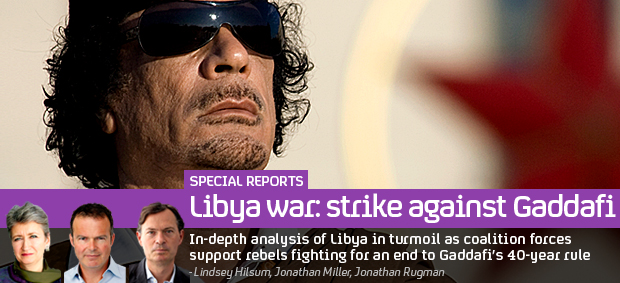UK Libya operation will cost around £260m
It is estimated that the UK’s military operation in Libya will cost around £260m. Defence Secretary Liam Fox said protecting civilians is driving up the cost.

UK military operations in Libya are costing taxpayers more than £40m a month, Defence Secretary Liam Fox said.
In a written statement to MPs, Dr Fox said the projected cost of the six-month, Nato-led campaign was “in the region of £120m”.
Another £140m would have to be spent replacing missiles and other munitions if the mission continued at the same rate, he told MPs.
“The Treasury has agreed to meet these costs from the reserve,” he added.
The government originally said the Nato campaign, which began in March, would cost tens of millions of pounds rather than hundreds of millions.
Dr Liam Fox insisted the higher spending was worth it because it showed Britain held the “higher moral ground”.
Speaking ahead of his written statement to the House of Commons, Dr Fox said people would “have to take into account that we have used more expensive precision weaponry so that we minimise civilian casualties in Libya”.
“And if we are going to fight operations in the future based on minimising civilian casualties there is clearly a financial price to pay,” he said.
“But I think that that shows that we are on the moral high ground and that we place a higher value on human life that the Gaddafi regime does.”
FactCheck: Are operations in Libya a moderate cost?
US Secretary of State Hillary Clinton said Libya’s opposition is making very clear progress on the ground in Libya.
Speaking at a conference, Clinton said there’s no doubt that Colonel Gaddafi’s men have “their backs against the wall.”
“There is very clear progress being made” by the opposition, Clinton said.
Prime Minister David Cameron has insisted that British forces can maintain the current level of operations in Libya despite concerns raised by senior military figures.
He told MPs the Strategic Defence and Security Review (SDSR) had allowed for flexibility in the armed forces.
Air Chief Marshal Sir Simon Bryant, the RAF’s second in command, has said operations in Afghanistan and Libya were together placing a “huge” demand on resources.
Last week, head of the Royal Navy Admiral Sir Mark Stanhope questioned the sustainability of current military operations, saying the Government would have to make “challenging decisions” if the Libya mission lasted more than six months.
But Mr Cameron warned the top brass: “You do the fighting and I’ll do the talking.”
Cracks in the Nato-led coalition appeared to surface yesterday with Italy calling for a ceasefire.
Italian foreign minister Franco Frattini has called for the “immediate suspension” of hostilities in Libya to allow humanitarian supplies to reach areas around the rebel-held city of Misrata and Gaddafi’s capital Tripoli.
But Mr Cameron’s spokesman told reporters that Italy had formally reaffirmed its commitment to the mission as recently as Monday, when EU foreign ministers met in Luxembourg.
